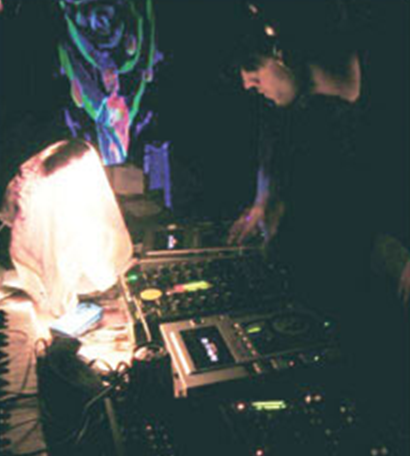Syed Salman Shah
(Created page with "{| class="wikitable" |- |colspan="0"|<div style="font-size:100%"> This is a collection of articles archived for the excellence of their content.<br/>You can help by converting...") |
Latest revision as of 12:23, 8 March 2014
This is a collection of articles archived for the excellence of their content. Readers will be able to edit existing articles and post new articles directly |
[edit] Getafix aka Syed Salman Shah/ trance
June 24, 2007
Pakistan on the psytrance map
By Nida Zafar
Those who danced were thought to be quite insane by those who could not hear the music
— Angela Monet (writer)
Most people who like to go out, dance and have a good time figure the only options are rock shows, concerts, private parties, commercial clubs, etc. Introducing them to psychedelic trance parties (more popularly known as ‘raves’) is actually doing them a favour, as far as I’m concerned, as there are very few other forms of nightlife where women are respected, people are as genuinely friendly and where there is a focus on improving the environment with art and visuals to stimulate the senses. Truly, trance is one of the most welcoming forms of nightlife.
Although Goa music has been around for decades in parts of the world, back home the underground trend was and still is inclined towards house music and more commercial trance. Psytrance is a form of electronic music that developed from Goa trance in the early 1990s, when it first began hitting the mainstream. It has a fast tempo, in the range 135 to 150 BPM (beats per minute). The name psychedelic provides an umbrella term for the many divergent styles this brand of trance has birthed, including Goa, melodic, dark, progressive and suomi. Referring to it as psychedelic also distinguishes the style from the ‘clubbier’ trance music and reinforces the roots of Goa trance in the psychedelic community.
“I find inspiration in all kinds of music. From our local scene I really admire the late Nazia Hasan. I think she was ahead of her time and would’ve wiped the floor with the so-called ‘pop’ artistes nowadays,” says Getafix While the masses have embraced the electronic music age, someone from our part of the world also took the initiative by following his passion for trance music. In 2002, Syed Salman Shah aka Getafix was infected with the psytrance bug in Switzerland where he was studying hospitality management and went to his first party where he heard and saw things that left him deeply impressed.
He was amazed by the strange and intelligent music which was playing havoc with people’s minds. Mesmerised by the music, he started DJ-ing but after a while he got tired of mixing other people’s music and decided to produce his own tunes. So began the lengthy process of learning the art of music production, the original goal being to assist the dancers in experiencing a collective state of bodily transcendence, similar to that of ancient shamanic dancing rituals, through hypnotic, pulsing melodies and rhythms.
Today, the 27-year-old Syed Salman Shah who was born in Peshawar and is a hospitality and tourism graduate, has been producing his own tunes for three years now. His style is groovy and melodic, designed for a good old fashioned stomp on the dance floor and best enjoyed in the wee hours of the morning. In May, 2007 he finally received his first break by getting signed with an international label, PsyPneumatix Records, and presently is the only Pakistani psytrance artiste to represent our country. Some view him as a Shaman back home — someone who doesn’t seek attention for himself but allows his ground-breaking music to be interpreted, each to their own. His efforts for the trance scene in Pakistan are numerous.
He visited Pakistan and organised Islamabads first outdoor party under the banner of Gem Events. It was a success among the youth and thereafter many raves followed and a number of new DJs were given the opportunity to showcase their talent.
Salman also plans to release his album by the end of this year, however his ultimate objective is to reach out to as many people as he can through his sound and not just sell records. One can stream his music on various web sites such as BeatBiz.net and MySpace.com music. Hoping to maintain his own unique style while still getting the dance floor going, one can say his music is made from the dancers’ point of view, yet not overlooking that freak sitting in the corner who likes to immerse into the state of trance.
So how did it all start for him? Salman tells us a bit about his evolution in trance, “I’ve been through several musical stages. As an angry teen I used to listen to metal which gradually gave way to commercial vocal trance. In 2002, a friend took me to my first psychedelic trance party in Switzerland. I knew right there and then that this was the music that I’d been waiting for all my life.”
About as for how he came up with the name Getafix and what it stands for, he says, “As a kid I was a big fan of Asterix & Obelix comics. In it there is a druid named Getafix who would prepare a magic potion that would give everyone superhuman strength. I kind of liked the name and the idea of people getting a ‘fix’ from my music.
“Until now my emphasis has been on melodic psychedelic trance as this is what gets listened to in Switzerland where I have been living for the past few years. Its energetic music for the dance floor geared to get you grooving. I hope to work on more styles and possibly do a fusion of electronic music with local influences,” he says.
About his influences in music, Salman says it’s tough to name a certain band or artist, “I find inspiration in all kinds of music. From our local scene I really admire the late Nazia Hasan. I think she was ahead of her time and would’ve wiped the floor with the so-called ‘pop’ artistes nowadays. Other than her, I also really admire the late Ustad Nusrat Fateh Ali Khan.
He says the Getafix track-producing process usually start with him getting inspired with an idea which makes him fire up the studio gear. Then he lays down the bass and drum tracks and gradually adds more sounds. “Finishing a track can take from a day to weeks or even months depending on how inspired I am at that particular moment.” His studio consists of a laptop computer, studio monitors, a soundcard, a keyboard midi-controller, analogue mixer and a synthesiser. “It’s an expensive hobby,” he adds.
As someone who just got signed with PsyPneumatix Records as the first-ever Pakistani psytrance artiste, how do you feel? “It’s a big deal for me as this gives some validation to all the hours spent in the studio. My aim is to get my music out there and have as many people listen to it and enjoy it as possible, and getting signed is a big part of this. The fact that I’m one of the first Pakistani artistes on the psychedelic trance scene also makes me proud”.
Do you also experiment with other froms of sound? “Yes I produce some vocal trance as well as some down tempo music such as lounge, chillout and ambient. In the future I hope to do something that will have more mass appeal and something that the Pakistani audience could identify with.”
Having placed Pakistan on the trance map, Salman’s plans for the near and far future include working on some vocal electronic music with a certain talented female vocalist as well.

